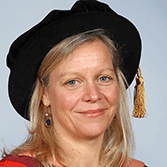Charlotte Moore
 Doctor of Laws
Doctor of LawsVice-Chancellor,
The aim of presenting an honorary degree is three-fold: to honour the individual for their contribution, to highlight their links with the University of Bristol, and to provide inspiration for new graduates.
The life and achievements of Charlotte Moore, who graduated with a Bachelor of Arts in History from this University in 1990, makes this all very easy.
Charlotte is Director of Content at the BBC with responsibility for the creative direction of all channels, BBC iPlayer and BBC Sport. She is in charge of a budget of more than £1billion and has the honour and responsibility of generating what appears on British screens large and small.
As one of five BBC Directors, her flair, imagination and gift for spotting talent and creativity brings benefit to the British public every day.
Charlotte was born 19 June 1968 and brought up in Surrey.
If today's graduates are children of the internet and social media, their parents - many of you sitting here - are, like Charlotte (and me) children of the television age. For us, television was more than just entertainment. It was a window onto another world, a world she was keen to explore.
Charlotte came to Bristol to study history, graduating in 1990. She was attracted to the history of the 'other', including the middle ages and the extraordinary places in Asia and Africa and the Pacific where she soon wanted to make films.
The History Department has changed dramatically since Charlotte graduated. She might be surprised to know that, among our present staff only one remains from the historians who taught her.
Vice Chancellor, it would be fair to say that Charlotte Moore's success is something for which we at Bristol can take little credit - if understandable pride. She has made her own way. However, she generously remembers that her three years as an undergraduate made and mark her and that they 'stay with you' as permanent and treasured baggage.
Leaving Bristol in her wake, Charlotte embarked on the challenging path of the freelance documentary maker. Her earliest credit as Associate Producer was for The Time Traveller (1993), a film about the return of environmental activist Norman Lewis, by then 84, to Irian Jaya (former Dutch New Guinea). She made Lagos Airport (1999) and Welcome to Lagos (2010) revealing the resourcefulness, pluck and adaptability of Nigerians living in a sprawling super city.
She began picking up awards. Her credits as producer/ director include Living With Cancer which won a Royal Television Society (RTS) award for best documentary series in 2002. Five years later Stephen Fry: the Secret Life of a Manic Depressive was awarded an International Emmy.
In these pieces she showed her ability to capture moments of drama and personal meaning for audiences. Living with Cancer gave voice to a 15 year old who had decided not to seek further treatment. Charlotte explained that great documentaries are about 'trying to get to the moment of truth', creating visual experiences that stay with people and - perhaps - give them courage.
What happened next is intriguing. Charlotte began to move from being a creator and seller of fine documentaries to that of commissioner and buyer.
She joined the BBC in 2006 and in 2009 became Commissioning Editor of Documentaries across all 4 channels.
She continued to commission superb documentaries which touched audiences and made them think, often with a medical ethics theme such as Terry Pratchett: Choosing to Die (2011). At the same time she was interested in what made people live and gave them joy. In her new role, the audience for doing this became bigger than ever.
Her career continued to rise, which is an appropriate metaphor for someone who commissioned The Great British Bake Off, a show arguably responsible for communicating more happiness to the nation than any other force.
In 2013, when she became BBC One Controller, she took Bake Off with her to the flagship channel. On 26 October 2016, the final was watched by an average audience of 14 million people.
Charlotte now has her finger on the pulse of the nation - dealing with the demands of a mass audience. So what drives Charlotte Moore?
She still wants to take people to places they have not been before. Some years ago, she was asked what young documentary makers needed to do to succeed.
I would like to paraphrase what she said for the benefit of today's graduates.
If you have an idea, be bold; come and persuade me. What commissioning editors are looking for are powerful narratives that show layers, depth and complexity. It is all about the energy of your idea.
Make it distinctive but communicate clearly to your audience. So innovate - but not to the extent that you end up on your own. Come and join the community of documentary makers. Don't hang on to your idea for so long - or protect it so well - that you are afraid to pitch it. Be brave and tell your story.
It would be hard to imagine a more inviting or uplifting vision for the creative industries.
Vice-Chancellor, I present to you Charlotte Moore as eminently worthy of the degree of Doctor of Laws honoris causa.